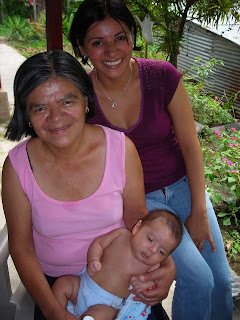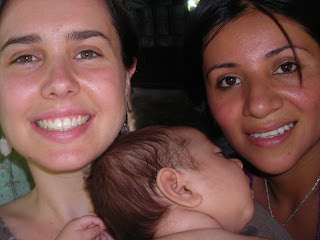On Saturday, I was able to spend most of the day visiting with friends in a community named Mariona. I think that it is such a grace to suddenly find yourself in a new phase of an old relationship, and realize that you, the other person, and what you share have all grown.
Griselda, her mom and Davidsito (!)
The economic crisis has hit El Salvador (like most vulnerable countries, I imagine) pretty hard. These friends run a women's cooperative in their community, which makes and ships artisan products -- mostly to clients in the US. Over the past year, however, they have had little to no orders which means little to no work. I would like to look for a way to create a sustainable business partner for them, so let me know if you or anyone you know would be interested. In the mean time, belt-tightening, despair and the search for piece-meal work have settled in in equal measures. I really don't know how they do it.. Nonetheless, we shared a dinner together (vegetables, beans, eggs, cheese and tortillas), and I left full of gratitude for many different reasons, but also weighed down by this shift in their already hard reality.
Oti and Roberto
During the visit, we talked a little bit about immigration, and the pro's and con's to one's immigrating to the US. Of El Salvador's 6 million citizens, approximately 20-25% currently reside in the United States. Hundreds leave the country every day to journey north, on foot or by train, and cross the Mexican desert to enter the US and look for work. I have yet to meet a Salvadoran family who does not have at least one family member living in the US. Remittances (money sent back to El Salvador from the US) totaled $3.8 billion in 2008, somewhere between 10% and 15% of El Salvador's total GDP for the year (U.S. Department of State, 2009). Yet despite the significant amount of dollars coming into the country (and they are in US dollars), the majority of individuals still live in poverty. The need for better economic opportunities in the country is clear, but where to find them?
When I was a student here in 2004, the family member of a close friend left suddenly for the United States. She had to leave behind her two children, then aged 9 and 4, and as of 2009, she has yet to be able to journey back. Without a passport, leaving the US could mean that she may never return, or have to risk another journey (costing upwards of $7,000) across the desert (an entry for another day, perhaps). Her family depends on the remittances she sends home. Coincidentally this woman now lives near Boston, and I was able to visit her on occasion during the last two years.
This bright, kind and otherwise vibrant woman lives between a rock and a hard space. Visiting her house sort of reminded me of the Anne Frank annex, where shades are constantly drawn, and most of life is lived indoors. Sporadic immigration raids -- such as those that happened in various US communities in 2007 and 2008 -- feed a constant and underlying fear and anxiety about one's security. I think, frankly, many of her roommates (all of whom had also immigrated to the US) were surprised that a young Anglo-Saxon woman would come to visit. Eventually, they granted me some confianza (trust) and I learned their stories.
Most of the people living in this house, including my friend's sister, had left their home countries of Latin America (Mexico, El Salvador, Honduras) due to economic conditions. Simply, there was no work to be found that they could sustain a family on. Most were women, and at least two that I know of left small children behind with other family members. Some had papers to be working legally in the US, while others did not. They worked in grocery stores, dry cleaners, and other generally low-paying jobs, and after rent and bills, sent any remaining money home to their families. The little money the sent was still more than what most believed the would have been able to make at home. One woman had left her developmentally-challenged daughter with a close neighbor, and was sending money home for her son to go to high school. Some had started new families in the US (in which husbands/fathers were almost always conspicuously absent...as they had been in Latin America; also an entry for another day), while others were holding out to return home. All of their situations were precarious. (Not to mention that the last time I visited, their hot water heater had been broken for months-- a chilly component to the Boston winter!)
La familia: Breneley, Kevin, Denis y Sarai
On the other end of the line, children in El Salvador are growing up without parents. How much is that worth? In the same family that I was mentioning above, it is the grandmother who is raising five grandchildren under the age of 15, doing most of the day-to-day parenting on her own. Gang violence is now wide-spread (also an entry for another day), with major selling points being security and camaraderie. Teen pregnancy, also abundant, may bear similar resemblance to the needs of young girls it is able to meet. Babies in high school or grammer school though inevitably means less education for girls and women, and the cycle starts over again.. Despite the abstract phenomena, the truths themselves are very real.
The family I mentioned above is not an exception to the rule, but much closer to the rule itself. How does this happen? Under what conditions does leaving one's children become the best option, the most feasible approach to life? These are questions that have been with me for a long time, the answers to which are still taking root.
A passage I read the other day said, "Pain we feel instantly, but truth slides into the heart like a glacier." El Salvador's many truths - unjust, hard, kind, sad, generous and hopeful - are still slowly sliding in, and they are all welcome.
Meeting baby David!




Beautiful photos! I wish I had an answer for your thoughtful comments about the injustices of our global economy. My only consolation is something I heard once from a priest who serves the poor of Haiti in Cite de Soleil. He said that we should not let these grim realities make us hopeless, but instead should all do the best we can to improve the lives of others in our own communities--our families, our neighbors--and in this way the entire world can be a better place. On the other hand, that attitude can easily be an excuse for complacency....so we all need reminders!
ReplyDeleteAunt Nancy
thank you thank you so much for writing and sharing el salvador. its like I'm there with you all over again. It has been a joy and a little bit of heartache to hear about family...
ReplyDelete